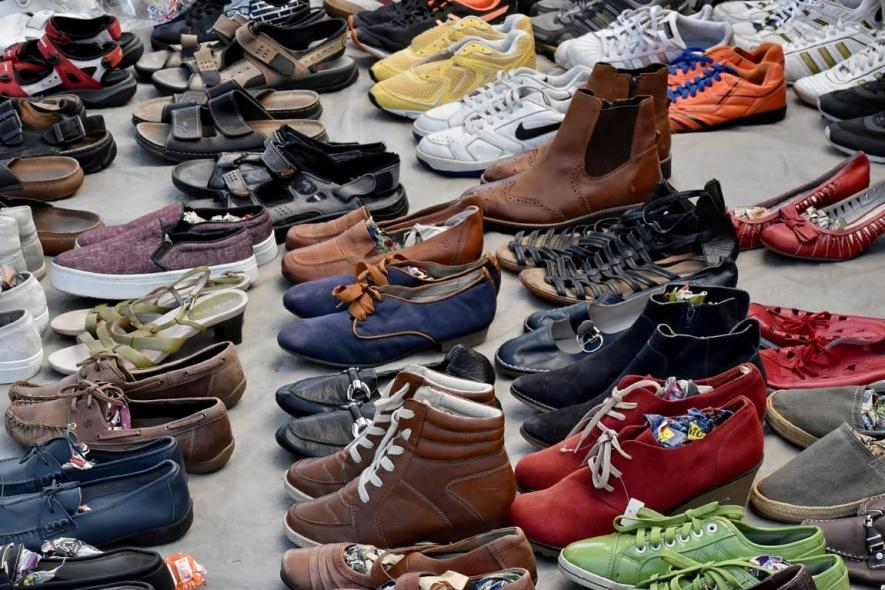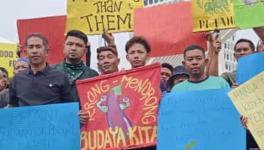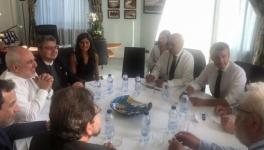Dow-Singapore Shoes Recycling Project Starts to Pinch

Representational Image. Image Courtesy: Pixnio
A “first of its kind” recycling programme launched by Dow Inc and the Singapore government to annually recycle 170,000 old shoe pairs from the country into jogging tracks, fitness corners and playgrounds has been exposed with the sneakers instead resold in Indonesia.
A Reuters investigation has revealed that almost all the 11 pairs of old shoes with hidden trackers in their soles donated by its reporters to the recycling programme in July 2022 landed at Singaporean second-hand goods exporter Yok Impex Pte Ltd.
In 2021 media releases, the US petrochemicals giant and Sport Singapore under the slogan ‘Others see an old shoe. We see the future’ called on the public to donate used shoes with rubberised soles to reduce the burden of Singapore’s incinerators and its only landfill.
Singapore residents started depositing thousands of used trainers, flip-flops and school shoes in dozens of wheelie bins placed across at parks, community centres, schools and outlets of retail sponsor Decathlon.
“I contributed 15 pairs of shoes,” student Zhang Youjia said in a video produced by Dow, which manufactures silicone rubber and plastic used in soles and midsoles of sports shoes.
However, Reuters found that none of the 11 shoes made it to a Singapore recycling facility and were moved to the warehouse of Yok Impex and subsequently to Indonesia’s Batam island.
Four pairs landed up in different locations in Indonesia that were too remote to track down in person and three others stopped sending signals after reaching Indonesia.
Reuters tracked two trackers on Batam using a smartphone app to Pertokoan Cipta Prima, a sprawling flea market catering to low-income shoppers.
Six stores were selling used shoes stuffed inside sacks emblazoned with the words ‘Yok Impex’ and the Singapore company’s dolphin logo.
The first pair, Nike running shoes, was found at the bottom of a mound of loose footwear at a gloomy cluttered shoe store. Reuters found that the pair had been bought back for 180,000 rupiah ($12).
The second pair, a women’s black Nikes, as at a nearby shop. They had been repurchased for 120,000 rupiah ($8). The other pairs went on a far longer sea journey.
The tracking app revealed that a pair of pink-orange New Balance trainers landed in the same market a week later. By early October, they were moved to the nearby island of Bintan before travelling 640 km to Medan, a city of 2.4 million people in northern Sumatra. On October 10, the shoes travelled another 1,290km to Jakarta.
On November 1, two Reuters reporters discovered the trainers at a cramped shop on the third floor of a Jakarta mall. The ‘transformed’ pair, with new laces, had been cleaned and cost 300,000 rupiah ($20).
“The project partners do not condone any unauthorised removal or export of shoes collected through this programme and remain committed to safeguarding the integrity of the collection and recycle process,” a Dow statement issued on behalf of all the sponsors on January 18 read.
Dow claimed to have launched an investigation along with Sport Singapore, Decathlon; Standard Chartered; ALBA W&H Smart City Pte Ltd and BT Sports Pte Ltd.
In an emailed statement sent to Reuters on February 22, Dow said Yok Impex would be removed from the project effective March 1 following the investigation’s conclusion without explaining why a used-clothing exporter was involved in retrieving footwear from the donation bins.
When the reporters visited Yok Impex’s premises in January, they found the wheelie bins stacked up in a backyard. Women employees were seen sorting through tables with piles of old shoes and transferring them into sacks like the ones spotted at the Batam market.
“Sometimes the workers mix it up. I’m not sure because we all collect from some other suppliers. It’s a mistake. I think some mistake,” Yok Impex’s logistics manager Tony Tan said adding that the company does not export shoes it collected for the programme.
When told that the reporters had found the donated shoes inside company sacks being resold in Batam, Tan said that shoes from the programme might have got placed in error with other footwear it exports to Indonesia.
Waste handler Alba-WH paid the company to collect the shoes from the donation bins and then deliver the shoes back to Alba-WH, Tan claimed.
The 2015 Prohibition of the Import of Used Clothing regulation in Indonesia bans the import of used clothes and footwear over hygiene, the potential of such items to spread disease and to protect the local textile industry.
However, Veri Anggrijono, the director general of consumer protection and trade control at the trade ministry, said, “It’s a well-organised activity because when we raid them in one place, then it will go quiet—then continue again,” adding that the illegal second-hand clothing import market in Indonesia is worth millions of dollars a year.
The importer is party liable under the law, not the exporter or market seller, Anggrijono said. Importers could be charged under trade and consumer protection laws, which carry penalties that can include imprisonment and fines, he added. But only import licences have been revoked and used clothing seized or destroyed.
Pointing to the torrent of cheap, unregulated second-hand clothing adding to the country’s mounting garbage problem, Dharmesh Shah, a policy adviser to the Global Alliance for Incinerator Alternatives, a non-profit working on waste pollution, said that much of that merchandise is in such poor condition that vendors cannot resell it.
“It just gets burned in open dumps or goes into rivers or landfills. They sort through it, and a very small percentage is reusable,” Shah added.
Two Batam market vendors requesting anonymity admitted to buying sacks of shoes from used-clothing traders like Yok Impex. They added that it is not uncommon to throw out half the shoes they receive because the footwear isn’t good enough to sell.
Another Dow’s ‘novel recycling’ scheme was exposed by Reuters in 2021 when it was found that an Idaho company was burning plastic trash to fuel a cement plant instead of turning into clean fuel using breakthrough technology.
According to environmental groups Greenpeace and Break Free From Plastic, such companies sell the promise of new recycling technologies to lull the public into a false sense of security about the environmental impact of increased consumerism.
Dow declined to comment further on the Reuters discovery.
Petrochemical companies should report on the results of their sustainability projects with the same transparency as the profit-making parts of the business, Jan Dell, founder of The Last Beach Cleanup, a US non-profit focussed on reducing plastic pollution, said.
“Dow promised to pick up these shoes and grind them into materials and make them into playgrounds, and instead they’re being found all over another country. They literally cannot be believed,” Dell said adding that promises about new recycling technologies also make good business sense for petrochemical companies.
According to a 2013 study published in the Journal of Consumer Psychology, a product advertised as a recyclable material sells more.
In the January 18 statement, Dow said that the shoe recycling partners were “energised by the common vision of sport championing a greener and more sustainable Singapore” and did not comment on the Journal study.
When a similar programme was launched by Dow in Malaysia last July, the company’s Singapore manager Paul Fong had pointed to the Singapore shoe programme as the blueprint for success in a promotional video. Dow had partnered with a local non-profit and a textile firm for that project. Neither responded to requests for comment.
Meanwhile, Dow is winning accolades in Singapore for the ‘recycling’ project. On October 6, Fong and other partners in the programme were presented with the ‘Most Sustainable Collaboration’ award hosted by the Singapore International Chamber of Commerce at the Equarius Hotel beach resort, on Sentosa Island.
Get the latest reports & analysis with people's perspective on Protests, movements & deep analytical videos, discussions of the current affairs in your Telegram app. Subscribe to NewsClick's Telegram channel & get Real-Time updates on stories, as they get published on our website.

















